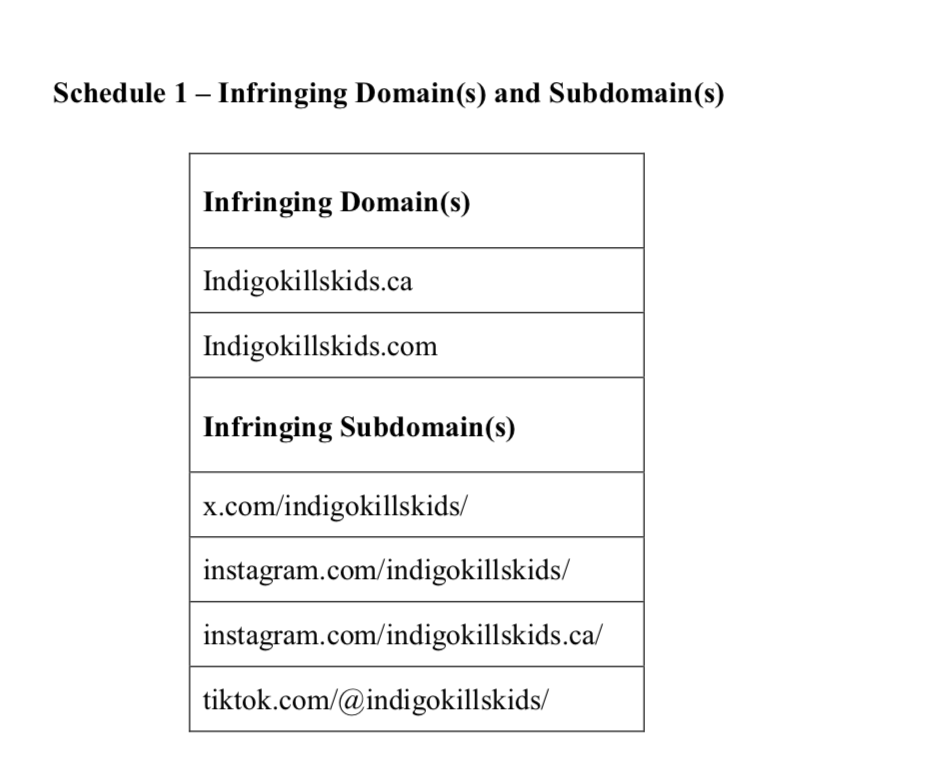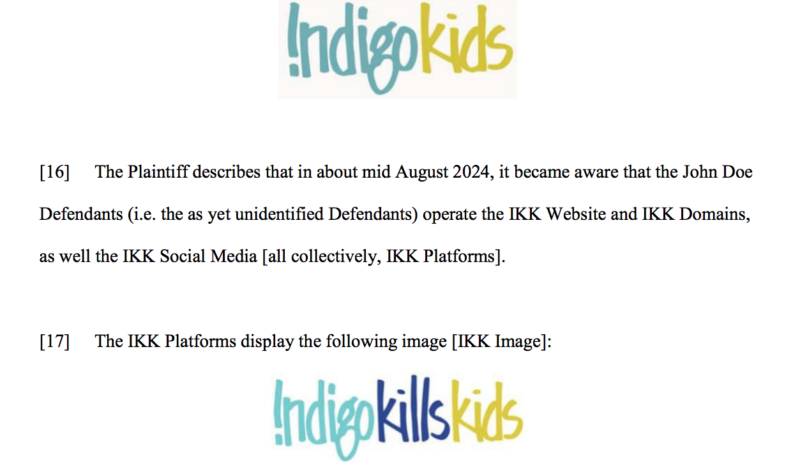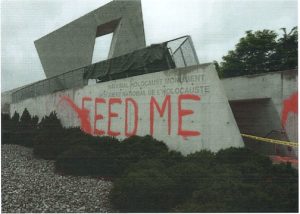Websites targeting the Canadian bookstore chain Indigo have been ordered to go offline for at least two years, based on a federal court injunction instructing internet service providers to block websites that imitate its retail branding while accusing the company of “killing kids.”
Justice Janet Fuhrer granted Indigo two court-ordered injunctions against the websites in an Oct. 23 decision, compelling Canadian internet providers to block the offending web domains related to the “Indigo Kills Kids” campaign. The order also includes measures that could additionally block the subsequently renamed iterations of the sites, along with two now-blocked “IKK” web domains.
The case was heard in Federal Court in Ottawa, with Fuhrer’s interim ruling issued Sept. 17 following the initial hearing that day, which was applicable until the current longer-term judgment.
The boycott campaign’s first iteration began under the name “Indigo Kills Kids.” Subsequent media attention to the legal action inspired Jewish organizations across Canada to promote a “buycott” of Indigo on Sept. 25, the day protesters across the country demonstrated outside Indigo retail stores.
Following the initial court injunction—which ordered the blocking of sites associated with that domain—the campaign shifted its message to “Boycott Indigo Books” and moved to a new web domain and social media accounts.
The website content incorporates or very closely imitates Indigo’s visual branding and design, while accusing the company of supporting the Israeli military—and by dint of association, its current battles—following the Oct. 7 Hamas attacks that killed 1,200 people in Israel and saw another 250 kidnapped. (The Hamas-run Gaza health ministry says there have been more than 41,000 casualties, including a reportedly high number of children. Israeli children are among the remaining hostages.)
The accusation against Indigo references CEO Heather Reisman’s Canadian charity, HESEG Foundation, which funds scholarships for lone soldiers from abroad to stay on in Israel following their military service. Long a target of demonstrations and boycotts in Canada over these links, protesters have now targeted Indigo in the context of the ongoing Israel-Hamas war.
In court, lawyers for Indigo argued that the websites and associated social media accounts cause “irreparable harm” to its brands, while also infringing on their associated copyright and trademarks and depreciating public goodwill toward its marks.
The decision by Fuhrer found in Indigo’s favour.
Indigo had demonstrated a “prima facie case of copyright infringement… and at least a serious issue, if also not a prima facie case, concerning the depreciation of the goodwill attaching to the [Indigo trademarks], particularly !NDIGOKIDS and !ndigokids Design,” Fuhrer wrote in the decision issued Oct. 23.
The judge found that the “IKK” image was a “substantial” copy of the Indigo Kids trademark, “[down] to the font, colour and graphics of the work, with the word ‘kills’ inserted between ‘!ndigo’ and ‘kids,’” Fuhrer wrote in the decision.
She acknowledged the “apparent” purpose of the offending websites was to damage Indigo’s “business and reputation, including tarnishing [its trademarks].
“In other words, the Defendants intentionally have attempted to attract the Plaintiff [Indigo]’s consumers to their own website for notoriety and in a manner likely, on its face, to tarnish the goodwill attached to the [Indigo trademarks],” wrote Fuhrer.
The website offers actions that users can take against Indigo, such as writing to the Canada Revenue Agency (CRA) about ending HESEG’s charitable status, and information about independent Canadian bookshops for readers to support instead of the chain store owned by Reisman.
Another petition provided a script for consumer letters to Indigo, pledging a boycott until demands are met—including Indigo dropping its lawsuit against the website, and for charges to be dropped against the remaining seven of 11 demonstrators who were arrested and charged in what Toronto police allege was a hate-motivated incident last year, when red paint was splashed and fake posters with Reisman’s image were pasted on Indigo’s flagship store at the Bay and Bloor intersection of downtown Toronto.
The judge supported Indigo’s claim of irreparable harm, noting the defendants deliberately remained anonymous—and acknowledged as much in their online activity—to avoid being held legally accountable.
“An X [formerly Twitter] post by ‘Indigo Kills Kids’ acknowledges the Court’s ‘temporary injunction on our domains for 14 days’ and describes themselves as ‘Your friendly faceless internet trolls,’” wrote Fuhrer in the Oct. 23 decision.
“The latter statement in particular reinforces my view that the John Doe Defendants actively seek to remain anonymous and to avoid liability or responsibility for their actions.”
Fuhrer wrote that the ongoing activities helped tip the balance of fairness considerations in Indigo’s favour regarding the website blocking decision, and that the order “does not limit freedom of expression or infringe upon open internet standards.”
“In itself, the Order is not one that engages freedom of expression values or interferes with the principle of net-neutrality.
“In the circumstances, I am satisfied that an interlocutory site-blocking order is an effective method of at least limiting access to the infringing IKK Website.”
Fuhrer noted that without named defendants coming forward “who could theoretically stand trial over the copyright and trademark infringement allegations,” the court order “provides a mechanism for adding other domains” if the unnamed defendants circumvent the court order by changing to other web domains.
In addition, she wrote, the inclusion of a “mechanism for amendment, updating and removal of domains and subdomains” would address any potential “over-blocking of unrelated websites.”
The judge also ordered the third-party internet providers to invoice any costs of compliance associated with the order to Indigo.
In the Oct. 22 hearing, lawyers for Indigo from Dipchand LLP, including May Cheng, argued that those behind the website knew what they were doing and were receiving messages from the legal team sent to the email address found there.
“We also know that service at the Proton Mail [a free encrypted email service] address has obviously been effective since there has continued to be commentary on these various social media accounts and domains with respect to the injunction itself, the interim injunction that was obtained,” Cheng told the court Oct. 22.
“There are violations of copyright protected works on the website… and the domains themselves clearly damaged the goodwill attaching to the trademark,” said Cheng during the virtual court hearing.
Cheng noted that “substitution and safeguards” would address the possibility of the website content appearing on other web domains
“There is a risk of a different domain being adopted and we’re alive to that,” she told the court, noting the request for the order to include a mechanism for amending the site-blocking order.
“We are hopeful that it will avoid a ‘whack-a-mole’ strategy by having those mechanisms in place to seek an amendment,” Cheng told the court, adding that if “use” of the offending content “ramps up somewhere else, that may be necessary,” and said the specific, narrow request to block the two named web domains amounted to the “least intrusive [legal] remedy.”

The two new court orders add Freedom Mobile as an additional ISP third-party respondent, along with VideoTron, Rogers, Telus and Bell; it orders Freedom to block the two offending “IKK” web domains and for the other ISPs to continue to do so.
All of the ISPs stated in court that they took no position on the order.
The second, much shorter decision orders the unnamed defendants to remove the websites, as well as the associated social media accounts.
Lawyers for Indigo hope to leverage this second order to compel social media platforms to take down the offending accounts associated with the campaign, and named specific social media accounts they hope digital platforms will suspend and/or remove, such as Instagram and TikTok accounts associated with the campaign to harm Indigo’s business.

The original “IKK” account on X appears to have been suspended, and some of the Instagram accounts also appeared to be offline, however, the X and Instagram accounts using the “Boycott Indigo Books” handles remained online as of The CJN’s press time.
Following the Sept. 17 injunction, the contents of the “Indigo Kills Kids” website and social media properties moved to new domains under the handle “Boycott Indigo Books.”
Meanwhile, demonstrators supporting the boycott took part in a national day of protests outside dozens of Indigo stores on Sept. 25, including around the Greater Toronto Area, in Montreal, Ottawa, and in B.C., both on Vancouver Island and in Greater Vancouver.

At that time, the boycott’s sticker campaign began, in which activists slyly attached false stickers or bookmarks blasting Indigo to books on the shelves in its shops. The stickers emulate the look of Indigo’s “Heather’s Picks” stickers and other Indigo branding, but with messages focused on HESEG’s support for Israeli soldiers. In addition, handbills from the boycott campaign were found in mailboxes in some Toronto neighbourhoods in the city’s west end in October.

With two years to determine its next legal moves, one interim step might be to seek an amendment to prevent variations on the “Boycott Indigo” and “Indigo Kills” phrasing appearing in other forms or via different web domains. That would involve returning to court, as would any claims against the judge’s order, if a named defendant stepped forward, lawyers for Indigo confirmed to The CJN.
The judge’s decision also noted that lawyers for Charlotte Kates and the Legal Centre for Palestine (LCP), who had appeared at the Sept. 17 hearing, did not provide the court with evidence of their standing to participate as either “an individual ostensibly associated with the IKK Website according to legal counsel,” or as an intervenor.
Kates is a director of Samidoun, a Vancouver-based organization that was named a terror entity by Public Safety Canada on Oct 15, but her lawyer, Tamir Israel, would not confirm in the Sept. 17 hearing if Kates was associating herself as a defendant, and the judge subsequently never received submissions from her, nor from the LCP as an intervenor, the decision shows.
A letter sent to the court by a lawyer for Kates had said she was “not prepared to oppose” the court motion “at this time.” The judge’s decision also noted that no defendant had come forward to claim responsibility.
Kates and Samidoun are named in a separate lawsuit filed by family members of the Canadian victims of the Oct. 7 Hamas attacks on Israel, and supported by B’nai Brith, to claim damages under Canada’s Justice for Victims of Terrorism Act.
The Ontario Superior Court lawsuit launched by the families of Tiferet Lapidot and Judih Weinstein Haggai, two of the Canadian citizens murdered in the Oct. 7 attacks, seeks $250 million in compensation from the Palestinian Authority, the Islamic Republic of Iran, Syria, and Samidoun, alleging that the named defendants are funding schemes that reward the families of terrorist attackers against Israel. Kates, her husband and Samidoun organizer Khaled Barakat, and Palestinian Authority leader Mahmoud Abbas are among those personally named in the lawsuit along with their organizations.
The lawsuit claims that so-called “pay-for-slay” programs that “[reward] Palestinians who carry out terrorist attacks against Israelis” make the Palestinian Authority liable under Canada’s Justice for Victims of Terrorism Act, wrote B’nai Brith in an earlier media release.
Author

Jonathan Rothman is a reporter for The CJN based in Toronto, covering municipal politics, arts and culture, and security, among other areas impacting the Jewish community locally and around Canada. He has worked in Canadian online newsrooms and on multimedia creative teams at the CBC, Yahoo Canada, and The Walrus. Jonathan's writing has appeared in Spacing, NOW Toronto (the former weekly), and Exclaim! magazines, and The Globe and Mail. He has also contributed arts, music, and culture stories to CBC Radio, including an audio mini-documentary report from Brazil.
View all posts








